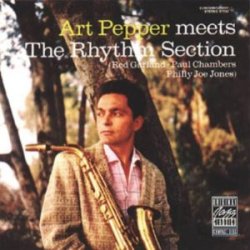Art Pepper Meets the Rhythm Section (1957)
Art Pepper Meets the Rhythm Section (1957)

1. "You'd Be So Nice to Come Home To" (Cole Porter) –5:30 2. "Red Pepper Blues" (Red Garland) –3:39 download 3. "Imagination" (Johnny Burke–Jimmy Van Heusen) –5:56 4. "Waltz Me Blues" (Paul Chambers–Art Pepper) –2:58 download 5. "Straight Life" (Art Pepper) –4:02 6. "Jazz Me Blues" (Delaney) –4:50 7. "Tin Tin Deo" (Fuller–Pozo) –7:42 8. "Star Eyes" (DePaul–Raye) –5:12 9. "Birks Works" (Dizzy Gillespie) –4:15 Musicians: * Art Pepper — alto saxophone * Red Garland — piano * Paul Chambers — bass * Philly Joe Jones — drums
The rhythm section in question here belonged to Miles Davis in Los Angeles, one fine day in January 1957. Pepper had made a name for himself in Stan Kenton's band, but this was really the first time he found himself in the studio with a rhythm section such as Red Garland, Paul Chambers, and Philly Joe Jones. In his fascinating biography, Straight Life, Pepper tells the story of the date when, after not playing for six months, he was told of the session that morning. He pieced together a broken horn, went in, and blew. Not completely remembering the first tune "You'd Be So Nice to Come Home To," he voices a line that both invokes the melody and refashions it. The rest of the session shows just how high Pepper rose to the occasion. It's one of the most important recordings of his career. ---Michael Monhart, Editorial Reviews
This date is traditionally seen as a watershed in Pepper's career, both in aesthetic terms and in terms of public recognition. Miles Davis was playing on the West Coast, & Les Koenig set up this date in which Pepper sits in with Davis's rhythm section (Red Garland on piano, Paul Chambers on bass, Philly Joe Jones on drums). Famously, Koenig & Pepper's wife Diane kept the date a secret from Pepper until the morning of the session, fearing that he'd be too nervous to agree to working with such a formidable group of East Coast musicians. Pepper was also deep in his drug problems, & hadn't picked up his instrument for ages. (The story is told in Pepper's autobiography _Straight Life_; I suspect there's a certain amount of self-mythologizing, but....) Almost miraculously, this hastily arranged pick-up date, with its assortment of easily-picked standards and a couple originals, turned out to be one of the best jazz records of the 1950s.
It's not perhaps surprising that Pepper & the Davis rhythm section hit it off. Pepper's style, though certainly strongly influenced by Charlie Parker, still is grounded in his affection for earlier saxophonists like Benny Carter & Lester Young; his repertoire often included pre-bop standards like "I Can't Believe You're in Love with Me" or, on this recording, "Jazz Me Blues" (from the Bix Beiderbecke/Frankie Trumbauer records). His signature tune, "Straight Life", given a superb reading here, is a lightning-fast contrafact on the old standard "After You've Gone". Miles Davis was similarly in the 1950s exploring 1920s and 1930s pop songs that the original boppers would rarely have touched (there's a telling anecdote in Davis's autobiography, about his struggle to get a cocky young Jackie McLean to learn the old standards instead of just concentrating on modern tunes). -- But Pepper was also pointing ahead to the future: though he was an elegantly pointed player with a great tone, his sound sometimes has distortions & bends that give great emotional impact to his playing (he is light-years away from the glibness & overrelaxation which sometimes afflicted West Coast jazz), an approach that was to make him one of the first of the older musicians to recognize the importance of Ornette Coleman & John Coltrane, & to incorporate elements of their freedom into his playing.
This is an essential modern jazz album. Those who enjoy it wll want to search out Pepper's other albums for Contemporary, such as the superb _Intensity_. There's also a fine disc called _The Way It Was!_, consisting of a first-rate previously unreleased session with Warne Marsh, & a bunch of outtakes, including one discarded tune from the _Rhythm Section_ sessions ("The Man I Love", if memory serves). Fans of Pepper tend to divide into two batches--those who love the work up to 1960 (before his extended sabbatical, first in San Quentin then in Synanon); & those who idolize the later work from the 1970s. I mostly belong to the first group; to my mind, the run of Contemporary albums Pepper did between 1955 and 1960 is one of the central documents in postwar jazz. --- N. Dorward "obsessive reviewer" (Toronto, ON Canada)
download: uploaded yandex 4shared mediafire solidfiles mega zalivalka filecloudio anonfiles oboom
Zmieniony (Poniedziałek, 21 Lipiec 2014 13:22)








